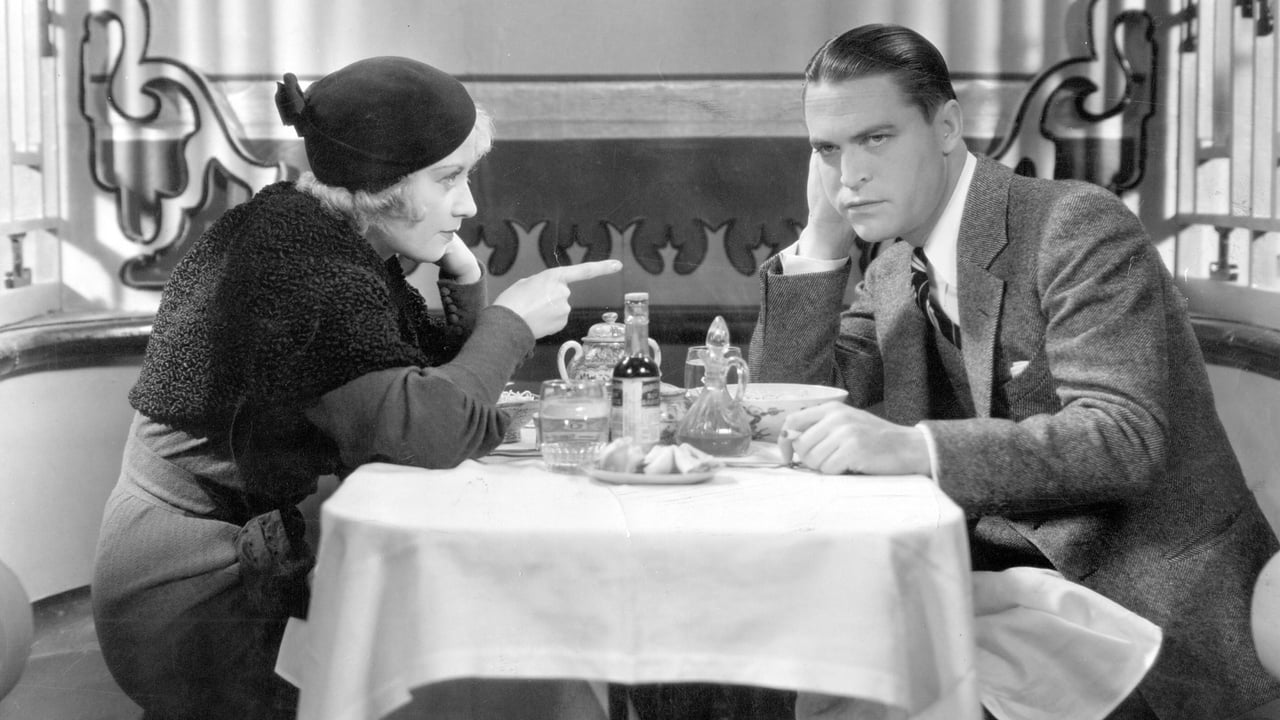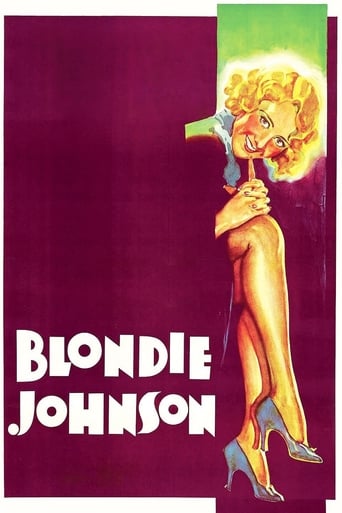

Amateur movie with Big budget
... View MoreThe thing I enjoyed most about the film is the fact that it doesn't shy away from being a super-sized-cliche;
... View MoreThe movie is wonderful and true, an act of love in all its contradictions and complexity
... View MoreThere is, somehow, an interesting story here, as well as some good acting. There are also some good scenes
... View MoreIn this before the Code drama Joan Blondell steps into Barbara Stanwyck territory playing a woman who we see rise to the top of the rackets and is pretty ruthless about it. As the film shows us Blondell had it pretty rough as a kid and now she's going to acquire the only thing that matters in this life, money.Along the way she teams up with another racketeer played by Chester Morris on loan from MGM who's also not a squeamish guy, but wants to settle down with Blondell as long as he leads when they dance. Blondell is not about to let anyone else lead in her life.I'm surprised this film is not better known if for no other reason than the acclaim that Blondell has received for her performances in those Warner Brothers gangster films. Usually she's just a leading lady for James Cagney etc. but her she's the lead, it's her film and she makes a fine job of it.If TCM ever broadcasts this, don't miss it. A must for Joan Blondell fans.
... View MoreHere is a Pre-Code Gangster Movie with, wait for it, a Female Mob Boss. There is an Interracial Couple (Japanese/White), a Low-Cut Peek at Joan Blondell, and some Bullet Blood. That's about it for the Pre-Code Highlights although there is some Bedroom Banter that would Later become Taboo. A Friend asks "Blondie, why don't you give him a tumble?" for Example.It's got typical Warner Bros. Snappy Patter and Chester Morris' forever present Dangling Cigarette is Stereotypically "charming". The Script Employs a Clever Con on a Jewelry Store, some Hard-Boiled Inner-Gang Violence and Always has Blondie with the Upper Hand.Another Highlight in this Atypical Depression Era Movie is when Blondie gets Frisked by a Cop "Woman", She finds a small caliber pistol Tucked Away very close to a Forbidden Location, that even in a Pre-Coder is Rarely Referenced or given any Attention, and the Scene does not Shy away from the Search as the Dyke like Cop has Her Hands right where they don't Belong.Worth a Watch for its Decisively Differentness and the Always Pleasing to the Eye Joan Blondell, where She, not Only Her Character, more than Holds Her Own with Her Tough Guy Companions.
... View MoreIt has been said that Joan Blondell's career suffered because she never got "Stanwyck parts." With BLONDIE JOHNSON, she got just that, and not even Stanwyck (before whom I bow down) could have done it better. Blondell is her usual wisecracking, tear-jerking, tough, funny, sexy self, but the film gives her more dramatic scope than usual and an edge of bitterness lacking in her wised-up-but-good-hearted sidekick roles. In the halcyon days of pre-Code Hollywood, it was no big deal for a movie heroine to be much, much smarter and more hard-headed than any of the men around her, as it was no big deal for a Japanese-American actress to a play a role in whichwith one humorous exceptionno mention is made of her ethnicity. (As part of a con game, Toshia Mori dresses up in a maid's uniform, but she's really a fur-swathed gangster's moll.) The film opens with a five-minute prologue that sums up the Great Depression with such raw intensity you can practically taste the despair. In a Welfare Office, the bedraggled Blondie Johnson (Blondell, wearing no make-up and a drab suit) pleads for aid. She has been evicted and her mother has pneumonia; she lost her job in a laundry because she resisted her lecherous boss, and her younger sister died after becoming pregnant at fifteen. When her mother dies too, Blondie decides that only one thing matters: "doughand plenty of it." A priest reminds her that there are two ways of making money. "Yeah," she replies, "The hard way and the easy way." The next time we see Blondie, she's wearing a snappy velvet suit and conning suckers out of $10 bills by pretending to be a damsel in distress. She's aided by a friendly cabbie (Sterling Holloway); their friendship is sealed when they realize they have both been trying to chisel each other. Though she's not above batting her eyelashes at the chumps, for Blondie the "easy way" has nothing to do with latching onto a sugar daddy. Fiercely protective of her virtue, Blondie is determined to use her brains to get ahead, and while she teams up with a racketeer named Danny (Chester Morris), she holds him at bay (he tends to "talk with his hands") even though she really likes him. It's just that she has big plans, and "the one thing that doesn't fit into them is pants." Her plans involve deviously plotting against the big boss and working some deliciously clever confidence tricks. Ultimately she rises to be head of the "corporation," all the while denying her true feelings for Danny, even to the point of ordering him rubbed out when she thinks he's squealed. You know where this is going, and it goes there, but despite a limp "we've learned our lesson" ending, it's a great ride.BLONDIE JOHNSON is obviously derivative of the previous year's BLONDE CRAZY, but here is a case where, in the words of Mae West, "too much of a good thing is wonderful." The only flaw is that Chester Morris is no Jimmy Cagney; he is convincing as a rather dim bulb and shares none of the chemistry with Blondell that lit up BLONDE CRAZY. The supporting cast helps fill the breach, with Allen Jenkins earning a laugh at his first appearance just by being Allen Jenkins; Mae Busch as Jenkins's world-weary girlfriend; the lovely and sardonic Toshia Mori; and the inevitable "other woman," Claire Dodd. (Blondell would memorably kick Dodd's buttliterallyin the next year's FOOTLIGHT PARADE.) Blondell effortlessly fills the central role, deepening the mystery of why she didn't get more starring parts. Matthew Kennedy, author of a new biography (I heard him introduce a glistening new print of BLONDIE JOHNSON at the Museum of Modern Art last week) suggests that Blondell was simply too reliable; she was so good at elevating mediocre material that the studio saw no need to give her better scripts.BLONDIE JOHNSON is a typical assembly-line product, predictable in the best possible way. From the art-deco lettering of the opening credits, so familiar from the Busby Berkeley series, to the courtroom finale, everything is just what you expect from Warner Brothers in the early thirties. The wisecracks go off regularly as popcorn popping. The music is dance-band jazz, the decor is pure deco, and Blondell sports some eyebrow-raising, peek-a-boo lounging pajamas. Society is indited for turning the underprivileged into criminals, and we are invited to enjoy their blithe crimes before they are dealt a half-hearted slap on the wrist. Blondell lends the lightweight yarn a core of gravity. Her wariness and cynicism cut through the fluff, even as her delectable looks, warmth and sly humor provide the necessary fizz. As Danny repeatedly tells Blondie, she's "a fresh dame." Seventy-five years later she's just as fresh, and she'll never go stale.
... View MoreWhile most of the movies in this period tried to find some new way of telling the detective story, many worked on the gangster side as well. Today, we don't quite appreciate the cleverness in the variety. I think in part because the things that didn't get embedded in the form just aren't seen even if you watch the movie.Superficially, this is a story of a poor gal who climbs her way to the top of the gang ladder and falls in love along the way in spite of herself. And it has some snappy dialog of the type common in gangster movies of the era. But it has ambitions beyond that, getting darn close to sex as power, sex as beneficial crime. Blondie not only has to fight male kingpins, but she has to best their molls too.All the sex is implied here, odd because of the time: before the code was enforced. But it permeates, even in the earliest scenes where Blondie is impoverished because she refused a screwing by the boss.Ted's Evaluation -- 1 of 3: You can find something better to do with this part of your life.
... View More